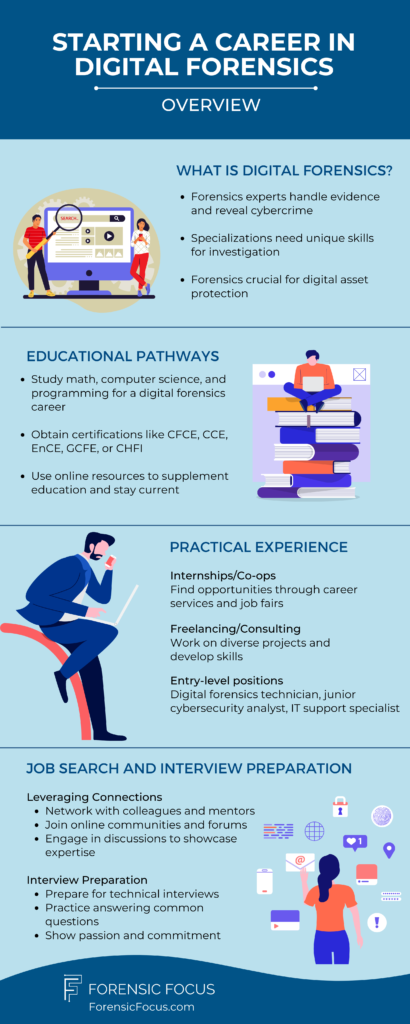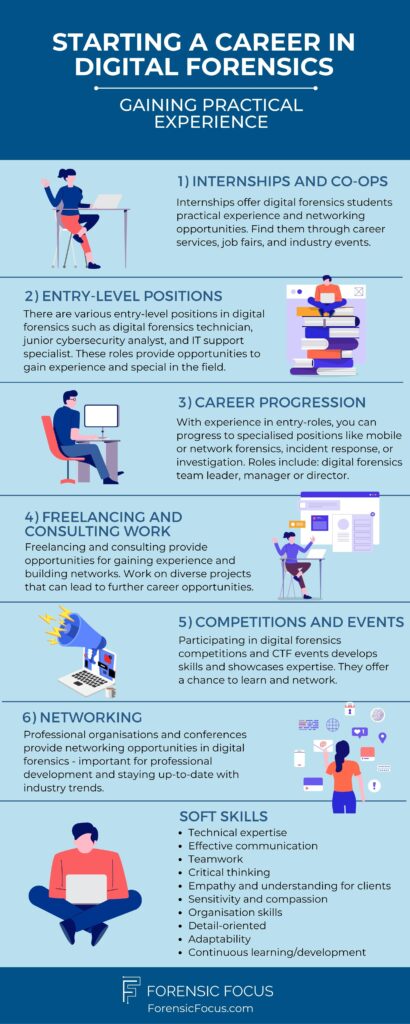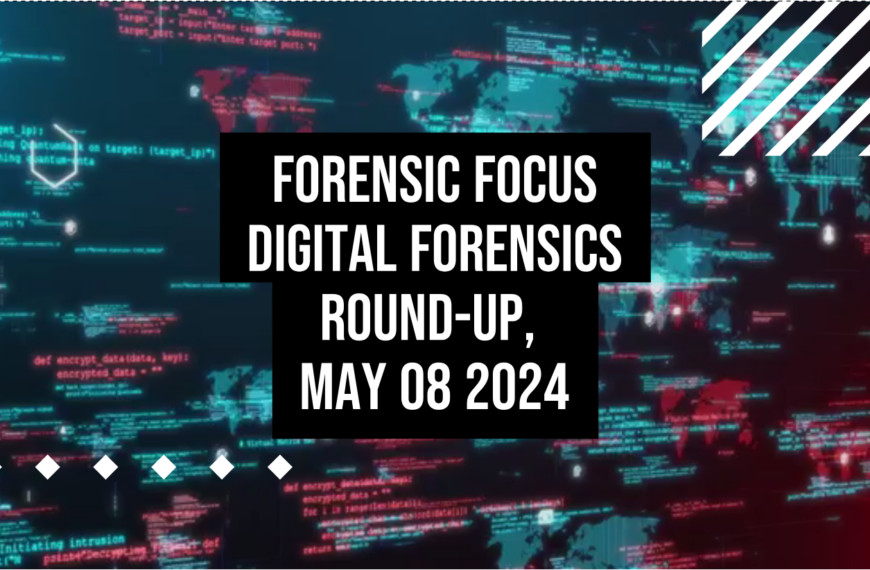Digital forensics is an exciting and rapidly growing field that deals with the investigation and recovery of digital evidence from electronic devices. As cybercrimes continue to increase, so does the demand for skilled digital forensics professionals. This article will provide a roadmap to help you navigate your way to a successful career in digital forensics, offering insights into educational pathways, practical experience, soft skills, and professional development.
What is Digital Forensics?
‘Digital Forensics is the process of identifying and reconstructing the relevant sequence of events that have led to the currently observable state of a target IT system.’ UK Cyber Security Council
The role of a digital forensics expert involves the collection, preservation, analysis, and presentation of digital evidence in legal cases, corporate investigations, and cybersecurity incidents. These professionals are responsible for uncovering digital footprints left behind by cybercriminals, which can include everything from data breaches to identity theft and online harassment.
Different areas of specialization within digital forensics include computer forensics, mobile device forensics, network forensics, and cloud forensics. Each area focuses on a specific type of technology or system, requiring specialized knowledge and skills to effectively investigate and recover digital evidence.

The evolution of digital forensics is closely linked to the rise of the internet and the increasing use of electronic devices in daily life. As technology advances and cybercrime becomes more sophisticated, digital forensics has become an indispensable tool for law enforcement and private organizations seeking to protect their digital assets.
To excel in the field of digital forensics, professionals must possess a strong foundation in computer science, information security, and networking. They should also have a keen attention to detail, excellent problem-solving skills, and the ability to adapt to an ever-changing technological landscape.
Educational Pathways
High school preparation for a career in digital forensics should ideally include courses in computer science and programming. This is not always necessary, however developing a strong foundation in these subjects will prepare you for more advanced coursework and certifications later on.
Undergraduate Courses
Post-secondary education options for aspiring digital forensics professionals include associate and bachelor’s degrees in digital forensics, cybersecurity, or computer science. These programs typically cover topics such as operating systems, computer networks, information security, and programming languages. Additionally, many programs offer coursework specifically tailored to digital forensics, covering key concepts such as digital evidence handling, forensic tools and techniques, and the legal aspects of digital investigations.
Graduate Courses
Graduate programs in digital forensics or related fields can provide advanced knowledge and specialized skills for those seeking to further their careers. It’s worth noting that some universities and colleges offer digital forensics as a concentration within broader degree programs, such as computer science or cybersecurity. Master’s and doctoral programs may focus on areas such as advanced forensics techniques, cybersecurity management, or cybercrime investigation.
You can search for digital forensics education courses around the world here.
Professional Certifications
Professional certifications are another important component of a digital forensics career. Some of the most respected certifications in the field include:
- Certified Forensic Computer Examiner (CFCE)
- Certified Computer Examiner (CCE)
- EnCase Certified Examiner (EnCE)
- GIAC Certified Forensic Examiner (GCFE)
- EC-Council Certified Hacking Forensic Investigator (CHFI)
Earning one or more of these certifications can demonstrate your expertise and commitment to the field, making you a more competitive candidate in the job market.
Online Resources
Online courses and self-learning resources, such as MOOCs, webinars, and blogs, can also supplement your formal education and help you stay current with the latest developments in digital forensics.
Practical Experience
Internships and Co-ops
Internships and co-op programs offer valuable hands-on experience and networking opportunities for aspiring digital forensics professionals. Numerous organizations, such as law enforcement agencies, government bodies, and private companies, provide internships in digital forensics or related fields, allowing you to apply the skills and knowledge gained in the classroom to real-world situations.
To discover internships and co-op programs in digital forensics or related areas, reach out to your university’s career services department, attend job fairs, and engage with potential employers through industry events. These resources can help you identify and secure practical experience in real-world settings. In addition, becoming involved in local or regional digital forensics groups can lead to further networking and learning opportunities, increasing the likelihood of obtaining internships or job offers.
Entry-Level Positions
In the digital forensics field, there are a variety of entry-level positions that can help you begin your career journey. In addition to general IT support which can often require an element of forensic investigation, some common entry-level positions with an even greater focus on DFIR activities include digital forensics technician and junior cybersecurity analyst.
Career Progression
As you gain experience and develop your skills in these entry-level roles, you’ll have the opportunity to progress towards more specialized roles or assume leadership positions within your organization. For example, you may choose to concentrate on specific areas such as mobile device forensics, network forensics, or cloud forensics, which require in-depth knowledge of particular technologies and systems. Alternatively, you may pursue a career path in incident response or cybercrime investigation, working closely with law enforcement agencies or private companies to combat cyber threats. As your expertise grows, you may advance into roles such as digital forensics team lead, digital forensics manager, or even director of digital forensics, overseeing the work of a team or department and driving the strategic direction of digital forensics initiatives.

Freelancing and Consulting Work
Freelancing and consulting work can provide additional opportunities to gain practical experience in digital forensics. By offering your services as an independent contractor or consultant, you can work on diverse projects and build a professional network that can lead to further career opportunities.
Competitions and Events
Participating in digital forensics competitions and Capture the Flag (CTF) events is another way to develop your skills and showcase your expertise. These events often involve solving complex digital forensics challenges in a competitive environment, providing an opportunity to learn from your peers and stay up-to-date with the latest techniques and tools.
Networking
Networking through professional organizations and conferences is essential for building connections in the digital forensics community. Organizations such as the following provide opportunities for networking, education, and professional development:
- International Association of Computer Investigative Specialists (IACIS)
- High Technology Crime Investigation Association (HTCIA)
- Digital Forensics Association
Attending conferences and workshops can also help you stay current with industry trends and connect with potential employers or collaborators.
Soft Skills
While technical expertise is critical for success in digital forensics, soft skills are equally important. Effective communication, teamwork, and critical thinking skills are essential for working with clients, colleagues, and other stakeholders in digital investigations.
Balancing technical expertise with empathy and understanding for clients is crucial in digital forensics. Professionals in this field often work with individuals who have been victimized by cybercrime or are facing legal challenges. Demonstrating sensitivity and compassion in these situations is vital for building trust and rapport.
Staying organized and detail-oriented in high-pressure situations is another key soft skill for digital forensics professionals. Digital investigations often involve large volumes of data and strict deadlines, requiring the ability to manage multiple tasks and prioritize effectively.
Adapting to an ever-changing field and staying up-to-date with emerging technologies is critical for long-term success in digital forensics. Professionals must be committed to continuous learning and professional development to stay ahead of new threats and maintain their expertise.
Professional Portfolio
Documenting your education, certifications, and experience in a professional portfolio is essential for showcasing your skills and accomplishments in digital forensics. Your portfolio should include a detailed resume or CV, copies of relevant certifications, and a list of any publications or presentations you have contributed to.
Showcasing your skills through case studies and personal projects can also help demonstrate your expertise and passion for the field. Examples of digital forensics projects might include developing new forensic tools, conducting independent research, or analyzing a simulated cyberattack.
Establishing a strong online presence through platforms like LinkedIn, a personal website, and a blog can further enhance your professional portfolio. Regularly updating these platforms with new accomplishments, experiences, and insights can help you stay visible and engaged with the digital forensics community.
Job Search and Interview Preparation
Job search websites such as Monster, CareerBuilder, Indeed and Totaljobs frequently list openings for digital forensics positions. You can also approach organisations directly. Law enforcement agencies hire digital forensics professionals to investigate crimes involving technology. Consulting firms and technology companies offer digital forensics services to clients in various industries, including finance, healthcare, and information technology. Educational institutions employ digital forensics professionals for research purposes or as instructors in related programses. And other organizations, such as non-profits and charities, may also require digital forensics expertise to protect their data and systems.
Tailoring Your Application
When preparing your professional portfolio for a specific job application, be sure to tailor the content to highlight your most relevant skills, projects, and experiences. Analyze the job requirements and emphasize how your background aligns with those needs. By customizing your portfolio for each job opportunity, you demonstrate your attention to detail and your genuine interest in the position, which can make you a more attractive candidate in the eyes of potential employers.
Leveraging Connections
Networking and leveraging connections in the industry can also play a significant role in your job search. Reach out to colleagues, mentors, and contacts from internships or professional organizations for job leads or referrals. It may also be worth joining digital forensics forums, social media groups, and other online communities to connect with professionals and enthusiasts in the field. These platforms offer additional opportunities for networking, learning, and staying informed about industry trends. By engaging in online discussions and sharing your insights, you can expand your professional network and showcase your expertise to potential employers and collaborators.
Typical Salaries
Salaries in the digital forensics field can vary widely depending on factors such as experience, job role, industry, and geographic location. Entry-level positions, such as digital forensics technicians or junior cybersecurity analysts, may offer starting salaries that are generally competitive within the technology sector. For example, in the United States, professionals in these roles might expect starting salaries ranging from $40,000 to $60,000 per year, while in the United Kingdom, entry-level salaries may range from £25,000 to £35,000 per year.
As you gain experience and specialize in specific areas or assume leadership positions, your earning potential can increase significantly. Mid-level digital forensics professionals, including those in specialized roles, can expect to earn between $60,000 and $100,000 per year in the US, and between £35,000 and £60,000 per year in the UK. Senior roles, such as digital forensics managers or directors, can command salaries well over $100,000 annually in the US, and over £60,000 annually in the UK. It’s important to note that these figures are only general estimates and can vary based on the specific circumstances of each individual and job opportunity, as well as regional factors such as cost of living and local job market conditions.
Interview Preparation
Preparing for technical and behavioral interviews is essential for landing a job in digital forensics. Technical interviews may involve questions about your knowledge of specific tools, techniques, or concepts, while behavioral interviews will assess your problem-solving skills, communication abilities, and teamwork. Practice answering common interview questions and be prepared to discuss specific examples of your work and accomplishments.
Demonstrating your passion and commitment to the field during interviews can set you apart from other candidates. Show your enthusiasm for digital forensics by discussing recent industry developments, sharing your personal projects, or explaining your motivations for pursuing a career in this field.
Conclusion
In conclusion, starting a career in digital forensics can be both challenging and rewarding. With the ever-growing reliance on technology and the increasing prevalence of cybercrime, skilled digital forensics professionals are in high demand. By taking the time to understand the field, acquire formal education, gain practical experience, and pursue professional certifications, you can lay a strong foundation for a successful career in this dynamic and rapidly evolving discipline.
Engaging with the digital forensics community, staying up-to-date with industry trends, and continuously developing both technical and soft skills are also essential for long-term success in the field. As you progress through your career, you’ll have the opportunity to explore a variety of roles, from entry-level positions to specialized roles and leadership positions, each with its own unique challenges and rewards.
By following the guidance and advice provided in this article, and taking advantage of the numerous resources and opportunities available, you can navigate your way to a fulfilling and impactful career in digital forensics. As you contribute to the fight against cybercrime and help protect the digital landscape, you’ll not only advance your own professional goals but also make a positive difference in the world of technology and beyond.
Keep an eye on the Forensic Focus jobs board for a list of vacancies. You can also get the latest DFIR news by signing up for our newsletter and hear the latest discussions by subscribing to our podcast.















